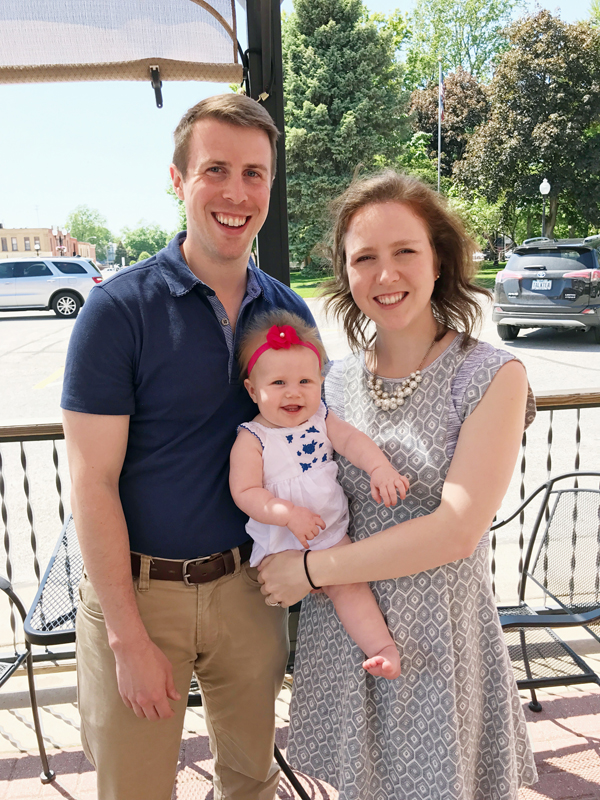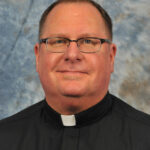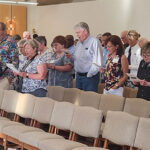By Lindsay Steele
The Catholic Messenger
Each year, the Catholic Church endeavors to share its beliefs about human sexuality, conjugal love and responsible parenthood through Natural Family Planning Awareness Week. The dates of Natural Family Planning Awareness Week highlight the anniversary of the papal encyclical Humanae Vitae (July 25), as well as the feast of Saints Joachim and Anne (July 26), the parents of the Blessed Mother.
Natural Family Planning — commonly referred to as NFP — allows couples to choose between one of several methods of identifying times of fertility and infertility within a woman’s cycle. Couples can use this information to attempt to avoid or achieve pregnancy. Older, calendar-based methods of NFP gained a negative reputation for being unreliable, as they did not take into account the variances in a woman’s cycle. However, newer, symptom-based NFP methods demonstrate an accuracy of about 99 percent in indemnifying times of fertility and infertility, according to the European Society for Human Reproduction and Embryology.
Although Natural Family Planning is the only method of family planning approved by the church, many Catholics are unclear about its methods and reliability, said Marianne Agnoli, diocesan coordinator of Marriage and Family Life. “It has been my observation that in general most people know very little about Natural Family Planning — or about their own fertility, for that matter — and that the little information they have been exposed to on the subject is often outdated and inaccurate. Even the medical journals tend to lump together all natural methods — including that of the much less accurate rhythm-method — when reporting NFP method effectiveness.”
To highlight Natural Family Planning Awareness Week, married couples in the Diocese of Davenport offered to share their experiences using NFP.
NFP helped us through infertility
Amanda and Charlie Nichols of Burlington learned the sympto-thermal method of NFP in preparation for their 2013 wedding. Initially, they found confidence in using their fertility awareness to postpone pregnancy in their marriage. Trying to conceive, however, was a different story.

Charlie and Amanda Nichols of Burlington pose for a picture with their daughter, Greta, earlier this year. Amanda, the director of Youth Ministry for Divine Mercy Parish in Burlington/West Burlington, used Natural Family Planning to help diagnose and treat her fertility issues.
They endured months of negative pregnancy tests, and when they did get pregnant about a year later, the pregnancy ended in miscarriage.
Amanda, 26, is the director of Youth Ministry for Divine Mercy Parish in Burlington/West Burlington. She’d always had “crazy cycles,” but doctors had never given her a reason for them. In college, she heeded doctors’ advice and took birth control pills to regulate her cycles, but the pills only treated the symptoms — they didn’t solve the problem. She stopped taking them during her engagement after learning about NFP.
In the midst of the frustration of not being able to achieve a pregnancy, Amanda looked back at her charts. She realized she was only ovulating four times a year.
To figure out their next steps, Amanda and Charlie decided to consult with Dr. Monica Minjeur, a Cedar Rapids-based physician. As a medical practitioner trained in Creighton Model’s FertilityCare system, Dr. Minjeur has the ability to use natural family planning methods to help identify and treat hormonal and gynecological problems.
In looking at Amanda’s charts, Dr. Minjeur noticed Amanda’s temperatures were lower than normal, signifying a possible thyroid condition. Charting also aided in the diagnosis of Polycystic Ovarian Syndrome, which explained the infrequent ovulation. Her doctors also determined low progesterone to be a likely reason why Amanda and Charlie had difficulty achieving a viable pregnancy even in the months Amanda did ovulate.
With this information, Amanda was able to combat these issues through changes in diet and progesterone supplements. The cycle after her miscarriage, Amanda conceived their daughter, Greta, who will turn 1 in September.
Given her experience, Amanda hopes to become an NFP instructor to help other women. “Right now, the closest NFP teachers —of any method — are in Iowa City and the Quad Cities, so southeast Iowa is lacking in support and education for fertility awareness and family planning. … I’m feeling called to bring more NFP awareness to this part of the state.”
Amanda also hopes that she and Charlie, 27, will be blessed with more children in the future. “It’s an ongoing journey,” Amanda said.
Mentoring, diligence are key
Tara Horesowsky, 25, knew she wanted to use Natural Family Planning when she got married. She just needed a little support.
In the months leading up to her June 2016 wedding to Bryan, 26, Tara started searching for an NFP teacher. “Our Catholic faith is important to us, so we didn’t really want to use any methods that weren’t exactly following the Catholic teaching/values,” Tara said.
Bryan admits he didn’t know much about NFP at first, and therefore had some misconceptions on its reliability as a family planning aid. “Just going off the name of it, I expected NFP to be all about getting a big Catholic family and not so much for planning when and how your family will start and grow.”
The couple, who are members of Holy Trinity Parish in Richmond, looked on the Diocese of Davenport’s website listing of NFP teachers. They chose to contact Marianne Agnoli, who teaches the Billings Method of Natural Family Planning. Tara said, “After sitting down with her, we were both much more comfortable with the science behind NFP and with the rules, and we were glad to have a lot of our questions cleared up.”
Bryan said, “Once we got more accustomed to NFP, I really liked it.”
The Billings Method helps couples identify patterns of potential fertility and obvious infertility within the cycle. Tara said tracking fertility symptoms takes diligence and can sometimes be challenging; she’s thankful that Marianne is always there to answer questions and offer support. “It’s an everyday thing, so it’s important to stay on top of it and not get behind,” Tara said. Having a supportive husband made things easier, and the couple often prayed for God’s will for their family. They knew they felt called to be parents; they just weren’t sure when.
Late last fall, Tara and Bryan felt the call to try to conceive. They weren’t sure what to expect, as they both have friends and family who struggled to conceive. Tara and Bryan use their NFP knowledge to identify times of peak fertility and left the rest to God.
In December, they found out they were expecting. Tara said, “It was the most incredible news and it was so clear to us that NFP helped us prevent pregnancy when it wasn’t the right time, and helped us achieve pregnancy when we felt that calling.”
NFP Q&A
Marianne Agnoli is diocesan coordinator of Marriage and Family Life. Married to Frank and the mother of two adult children, she has used NFP for more than 30 years and is a Billings Method instructor. She shared her insight on some of the most commonly-asked questions regarding Natural Family Planning.
How can NFP strengthen relationships? NFP relies on couple communication, discernment and corresponding behavioral adjustments. It requires the husband and wife to cooperate with each other in one of the most intimate areas of their lives. During the times of periodic abstinence, a couple learns to practice several virtues (patience, self-control, self-giving, understanding, etc.) which transcend well beyond the marriage bed and into all aspects of their marriage and family life.
How can a couple discern whether it’s the right time to postpone a future pregnancy? Reasons to limit family size may include physical, psychological, economic and social conditions with respect to moral law. Since a husband and wife are co-creators with God, discerning the timing of the creation of a new life will hopefully include intentional communication among all three of the actors.
Can you speak about the importance of having a mentor on the NFP journey? It is important that a couple be taught NFP from a certified instructor in order to ensure that they are being instructed properly. Couples should continue to have their charts reviewed by instructors until they are confident in their understanding and application of the method. Couples are also encouraged to contact an instructor at any time they have questions or when a significant change in fertility has occurred (after a pregnancy, while breastfeeding/weaning, perimenopause, etc.)
Where can readers go to learn more about NFP methods and training opportunities? A current listing of Diocesan Natural Family Planning Instructors and Resources can be accessed through the diocesan website at https://www.davenportdiocese.org/natural-family-planning
Questions? Contact: Marianne Agnoli, MPH, MPTh Marriage & Family Life Coordinator Diocese of Davenport 780 W. Central Park Ave. Davenport, IA 52804 563-888-4242 or agnolim@davenportdiocese.org











